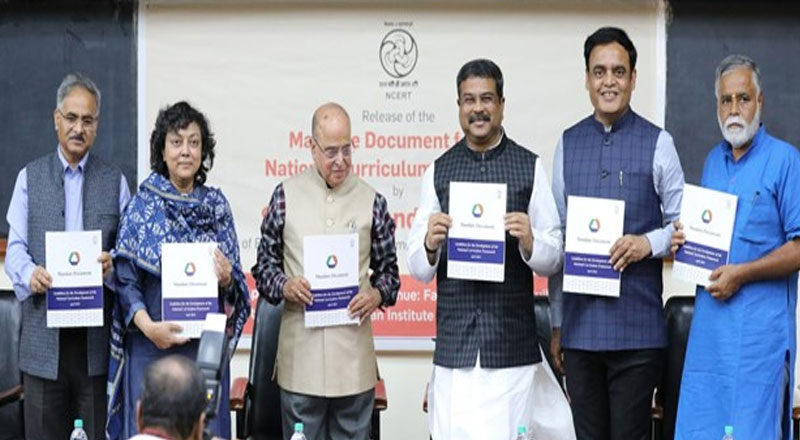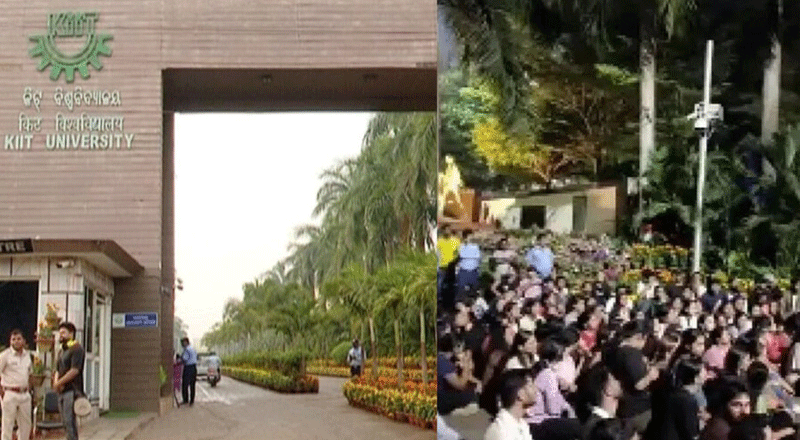Union Education Minister Shri Dharmendra Pradhan today released the ‘Mandate Document: Guidelines for the Development of the National Curriculum Framework (NCF)’ at a function held at Indian Institute of Science, Bengaluru.
Dr. K. Kasturirangan, Chairperson, National Steering Committee for the National Curriculum Framework, Dr. Ashwathnarayan C. N, Minister for Higher Education, Government of Karnataka, Dr. B. C. Nagesh, Minister for Primary and Secondary Education, Government of Karnataka, Ms. Anita Karwal, Secretary, Department of School Education and Literacy, Ministry of Education, Government of India, and Prof. Dinesh Prasad Saklani, Director, National Council of Educational Research and Training (NCERT) were present on the occasion.
Speaking on the occasion, the Minister said that the National Education Policy 2020 is the ‘Philosophy’, National Curriculum Framework is the ‘Pathway’ and the mandate document released today is the ‘Constitution’ to champion the changing demands of the 21st century and positively impact the future. He further said that the mandate document will bring about a paradigm shift with focus on holistic development of children, emphasis on skilling, vital role of teachers, learning in mother tongue, cultural rootedness. It is also a step towards decolonization of the Indian education system, he added.

Terming the preparation of National Curriculum Framework a scientific and continuous process and NCF a society’s document, he suggested creating an app-based process to enable suggestions for the NCF from every citizen of our country.
Appreciating the experts, academia and intellectuals for making possible this landmark day in our Indian knowledge system, he said that India’s model of education based on the NEP 2020 will act as a benchmark for emerging economies across the world.
During the launch event Dr. Ashwathnarayan C. N said that the education is one and the only way to strengthen and improve the quality of living of citizens of the country or the entire world. He further said that with NEP, the real transformation has begun and our country is moving towards brighter future.
Dr. B. C. Nagesh while addressing the gathering said that NEP is going to play a significant role in the socio-economic development of the country and the new education system will also contribute to the welfare of the world.
Dr Kasturirangan said that there is a need to bring in greater flexibility in the education system. The NCF will contribute to building an education system which can stand the dynamics of the changing times and fulfills the need of the 21st century, he added.
Central to the implementation of the transformative National Education Policy 2020 is the new National Curriculum Framework (NCF) which will empower and enable outstanding teaching and learning in the country, by converting the vision of the NEP 2020 into reality in our schools and classrooms. The development of the NCF is being guided by the National Steering Committee (NSC), chaired by Dr K Kasturirangan, supported by the Mandate Group, along with the National Council for Education Research and Training (NCERT). The NCF includes the National Curriculum Framework for School Education (NCFSE), the National Curriculum Framework for Early Childhood Care & Education (NCFECCE), the National Curriculum Framework for Teacher Education (NCFTE), and the National Curriculum Framework for Adult Education (NCFAE).
The ‘Mandate Document’ guides the development of the NCF. The Mandate Document is the bridge between the NEP 2020 and the NCF. Some of the important characteristics of the National Curriculum Framework, as envisioned in the Mandate Document to achieve these goals are:
- It delineates the process of the development and the characteristics of the NCF
It provides clear and specific anchors for the NCF to the vision, principles, and approach of NEP 2020
- It sets the mechanisms for the development of a coherent and comprehensive NCF, fully leveraging the widespread consultations already under way
- The process designed ensures the seamless integration imagined – vertically (across Stages) and horizontally (across subjects in the same Stage) in the NEP 2020 – to ensure holistic, integrated, and multi-disciplinary education
- It enables the critical linkage between the curriculum of schools with the curriculum of Teacher Education as an integral part of the transformative reforms envisioned by the NEP 2020 in the overall Teacher Education sector, thus enabling rigorous preparation, continuous professional development, and a positive working environment for all our teachers
- It informs the creation of opportunities for life-long learning for all citizens in the country
- Directly ‘useable by’ and ‘relatable to’ the most important stakeholders in education – teachers, students, parents, and communities across the country – to enable and empower, change and improve the reality of education practice
- Anchored and informed by sound theory and cutting-edge research, yet using simple language with real-life illustrations from classrooms and schools in a variety of contexts
- Outlining a systematic path for step-by-step movement from current reality to the ideal to ensure real progress in education that touches the lives of all
Widespread national consultations with multiple stakeholders are taking place for the development of the National Curriculum Framework:
- Teachers, school principals, anganwadi teachers, teacher educators, parents, community members, students, non-literates, neo literates, and education experts
- District-level consultations in every district of the country
- More than 700 State-level Expert Groups in States and Union Territories across subjects and cross cutting themes
- 25 National-level expert groups including international experts
- The inputs being gathered are being analyzed rigorously, to draw the best, to be incorporated in the development of the NCFs by the Steering Committee, along with the Mandate Group, and the NCERT.
- A robust and comprehensive mechanism adopted using technology including machine learning to collect and collate inputs from all stakeholders to make the entire process near-paperless.
In addition to these consultations, NCF will also fully account for other initiatives like NIPUN Bharat, the national mission for Foundational Literacy and Numeracy by the Ministry of Education, which are being implemented with the required urgency even as the NCF is being developed.





